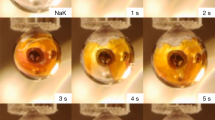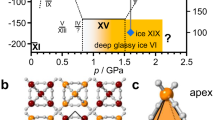Abstract
IN the course of an investigation of electrical properties of ice1, it was noted that the structure of polycrystalline ice grown from liquid water was sensitive to whether or not an electric field was impressed on the sample during growth. In that work, samples were grown in a set of identical cells between gold-plated brass electrodes. Some of these cells were connected to a battery, some were open-circuited, and some were short-circuited. The qualitative observation was made that the crystallites produced in the cells connected to a battery during growth were substantially smaller than those in open-circuited cells and that these in turn were somewhat smaller than those of samples grown in short-circuited cells.
This is a preview of subscription content, access via your institution
Access options
Subscribe to this journal
Receive 51 print issues and online access
$199.00 per year
only $3.90 per issue
Buy this article
- Purchase on Springer Link
- Instant access to full article PDF
Prices may be subject to local taxes which are calculated during checkout
Similar content being viewed by others
References
Brill, R., and Camp, P. R., Res. Rep., 68, U.S. Army Cold Regions Res. and Engin. Lab., 6 (May 1961).
Edwards, G. R., and Evans, L. F., Trans. Farad. Soc., 58, No. 476, 1649 (1962).
Author information
Authors and Affiliations
Rights and permissions
About this article
Cite this article
CAMP, P., BARTER, C. An Electrical Effect on the Growth of Ice Crystals. Nature 200, 350–351 (1963). https://doi.org/10.1038/200350a0
Issue Date:
DOI: https://doi.org/10.1038/200350a0
Comments
By submitting a comment you agree to abide by our Terms and Community Guidelines. If you find something abusive or that does not comply with our terms or guidelines please flag it as inappropriate.



